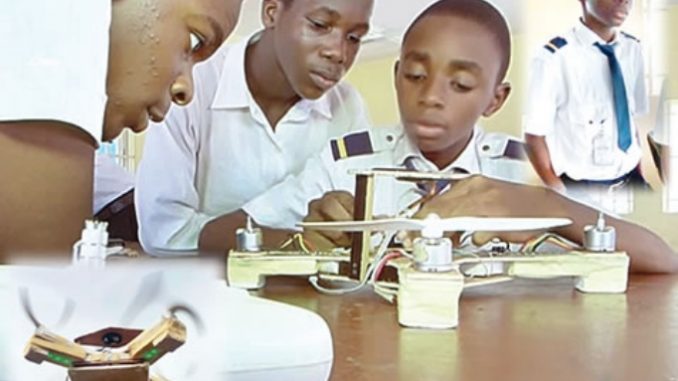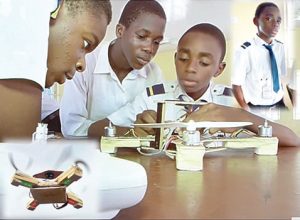
David Opateyibo was 17 years old when he built Nigeria’s first locally-made drone in Lagos.
Opateyibo led a team of Lagos State Polytechnic students to produce the country’s first prototype of a drone, which authorities in Lagos hope to deploy for security surveillance.
The drone project is part of the training curriculum in the University with the aim of developing technology that will be at par with the rest of the world whilst empowering young people and providing job opportunities.
When tested, Opateyibo’s drone could fly 15 minutes in the air with a maximum altitude of 2000 feet.
The drone is a high breed mix of existing drone components and locally fabricated material.
“Aside from using drones for aerial surveillance, you can also use them for aerial photography and videography, or for broadcasting, incidence control or pipeline and power line inspection. You can also use drones in agriculture, to analyze farm produce,” Opateyibo said in an interview.

Pic Credit: nairaland.com
There’s continuous discussion among the team members on improving the capability of the first Nigerian made drone.
Even though Opateyibo was a student, he was also one of the associate instructors chosen to participate in building the first aircraft, STOL CH750 at Zenith Aircraft Company’s facility in Missouri US and Mexico.
The aircraft is the first of its kind in the country built by five students – Opateyibo, Fausat Idowu, Aliyyah Adio, Michael Fakuade and Abdul-Hafeez Onisarotu.
When completed, the plane, according to Solomon Adio will be shipped back to Nigeria and put it into use as both a training tool and a functional aeroplane.
Known for his inventiveness when it comes to innovation, Opateyibo received his Applied Aviation Science certificate at the International College of Aeronautics, Ojodu-Berger, Lagos state.
When he is not working, he spends time playing musical instruments, building robots and trying very hard to be a good artist. He will return to Nigeria as certified Drone Pilots, Drone Instructors and Aircraft Builders and add value to aviation training programs at Laspotech ICA Aviation Centre.
Asked about what his greatest achievement in life would be, David said: “I have no limit. I feel my greatest accomplishment would be influencing as many lives as possible positively; contributing to the development of wherever I find myself. My greatest achievement would be in service. When it comes to what I want to achieve, the sky is the starting point. I want to be a force of progressive and revolutionary change in the world, as a whole.”
